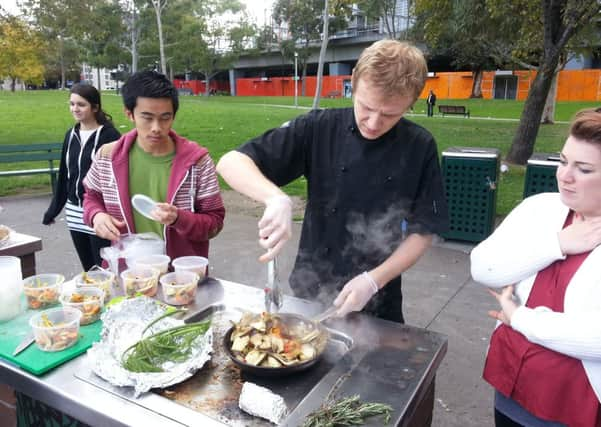Waste not want not for the restaurant selling leftovers


Imagine walking into a café, ordering something, eating it and then deciding how much you want to pay.
It’s called “pay what you feel” and it’s coming to Leeds some time in the new year. It’s the brainchild of head chef Adam Smith, a 28-year-old who has spent the last few years living in Australia, where he first came into contact with the idea.
Advertisement
Hide AdAdvertisement
Hide Ad“There’s already several big restaurants in Melbourne which do this. The idea has been tried and tested and it works. When I went to Australia I found work on a farm and one thing which struck me was the amount of food waste.
“Farmers over here have the same problem and it comes down to supermarkets, who can basically just cancel an order at the 11th hour, which leaves the farmer with a lot of unwanted food.
“In Australia, I saw a lot of edible food being either fed to livestock or just ploughed back into the soil. The only problem in terms of getting that unwanted food has been one of logistics. I am in a position where I am able to arrange for transport for unwanted food. The Real Junk Food Project is about making use of this food and feeding people.”
Adam’s CV makes impressive reading. He’s worked as head chef in several Leeds restaurants, including Carluccio’s, TGI Fridays and Jurys Inn, in addition to several in Australia. He returned to the UK to start a family with his partner but is keen on getting the enterprise off the ground.
Advertisement
Hide AdAdvertisement
Hide Ad“When we open the ‘pay what you feel’ café, people can literally do that. If they have no money, they can come and work in the kitchen and wash pots for an hour. What we found in Australia was that when you leave that choice up to the customer many people end up paying more than you would have charged them. Some obviously pay less, but overall it tends to even out.
“Our aim is to abolish food waste produce through a sustainable approach, feeding those that are food insecure in the process.”
The project will arrange for the removal of almost any kind of waste, from cardboard, paper and plastics, to bricks, food (both edible and inedible) and soil.
“We up-cycle and recycle everything to create urban ‘guerrilla’ gardens,” says Adam. “It’s things like building chicken coups and bee hives. We are also working on an education programme for schools. We will also be providing mothers with free baby food, grown in our gardens, and cooked by myself .”
Advertisement
Hide AdAdvertisement
Hide AdA recent report showed that while household food waste has reduced by 21 per cent since 2007, the average family still throws out the equivalent of 24 meals a month. Add in food supermarkets throw out and you’re looking at a mountain of waste. It’s one that FoodCycle is hoping to make a dent into. It’s one the national charity is hoping to make a dent into and is now collecting unwanted food from Sainsbury’s in Moortown, Leeds.
Hub leader Jemma Russell says: “We use it provide meals for asylum seekers and refugees who attend a conversational English class in Little London.
“We feed between 40 and 60 people each time we do that. We would, however, love to open up another session and open it up to everyone, we are always looking for volunteers.”
It also ticks a lot of boxes for the supermarket.
Sainsbury’s Moortown manager Phil Thompson says: “At the end of the day we are a business and we are here to make money but it’s part of our values to get involved with the community and this project has benefits for us and them.
Advertisement
Hide AdAdvertisement
Hide Ad“I’m happy food is not simply going to waste. We collect and donate things like tins with dents on and other food which while it is still fit for consumption, we would not sell.”
FoodCycle has been up and running in Leeds since 2010 and alongside the Little London project another, based in Chapel Allerton, operates on the first Saturday of the month and is open to everyone.
Darren Renz is one of the FoodCycle volunteers and in addition to the scheme helping others, he says his involvement has helped him overcome some personal problems.
“It’s been great for me in terms of helping me to come to terms with my own problems because it’s all about meeting people and being sociable,” says the 39-year-old.
Advertisement
Hide AdAdvertisement
Hide AdThe Chapel Allerton arm of FoodCycle is based in the former Shoulder of Mutton pub and the project has been shortlisted for a national award, the Positive Practice in Mental Health awards. The winner will be announced at a gala dinner in Sheffield on December 5.